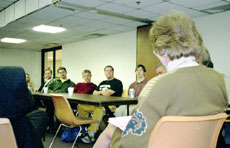Southern students invade Capitol

Members of the Student Senate visited the Capitol Feb. 18 to discuss issues facing Missouri Southern with area legislators.
Members of the Student Senate invaded the Capitol Feb. 18 on a quest for insight on the issues facing Missouri Southern.
Following a photo shoot with the Joplin and surrounding areas’ legislators, the students engaged in a round table discussion on the progress of the bills affecting the College.
Sen. Gary Nodler (R-Joplin) reported on the status of his bill, Senate Bill 55, that would change the College into a university.
Debate on SB55 hit the Senate floor Monday, and Nodler said he expects the bill to be resolved out of the Senate by the end of the week. The bill passed through the Senate Feb. 19.
“If passed, it gives the House two vehicles to work from,” he said.
On the House side, all the name change bills have been combined into one.
“The problem with all the schools on the same bill is that there is a big turf war going on between MU and SMS,” said Rep. Steve Hunter (R-Joplin).
The students were also interested in hearing the legislators’ opinions on the budget problem.
Hunter said the dilemma with the budget is finding out where all the money is hidden.
“The budget is linked with the tobacco legislation,” Nodler said. “The governor has chosen to marry those issues.”
The legislators in the room were all in agreement that using the tobacco money to fix the budget is not the best way to pick up the slack.
The atmosphere lightened when legislators joked about their age in relation to the year the tobacco bond debt (if legislation is passed) will be completely paid for.
“It’s just spending more one-time money to get through a budget crisis,” said Edgar G.H. Emery (R-Lamar).
Nodler said the compromise is the least offensive way they could come up with.
Taxing is not how the House majority wants to fix the budget, Hunter said.
“We’re looking at some pretty serious cuts next year,” Hunter said.
He said what’s difficult is that every program is a “sacred cow” to its advocates.
To deal with the task of determining who or what program attains funding, Rep. Kevin Wilson (R-Neosho) said the House is moving toward a “performance-based budget.” He said every entity that desires money has to justify every penny.
“If you want it, tell me why, what you’re going to do with it, and how it benefits the State,” Wilson said.
In the Senate chamber, Nodler said they are using a cost-benefit analysis to determine who or what gets funding.
Emery told the Student Senate it needs to keep in mind that although the budget is $19 billion this year, 10 years ago it was $9 billion. Revenues have gone up 68 percent and funding for education has increased by 148 percent.Emery said this budget crisis is not a new thing.
“This hole has been dug for at least five years,” he said. “It just was recently announced.”
He told the students he remembers when he was in college, he didn’t worry about the budget or the state government.
“It is now your problem because it affects your institution,” Emery said.
Zack Odem, president of Student Senate, asked legislators what makes higher education more dispensable than elementary and secondary education. Hunter explained that while higher education is important, it’s also an extra. Attending grades K-12, however, is the law.
Nodler added the state has the power to affect the revenue of higher educational institutions, but he believes there is an overreliance on cuts to the department.
Doug Carnahan, dean of students, asked why higher education was getting more of the budget ax than other programs.
“There are places where cuts are more dramatic than anything education has seen,” he said.
Emery told the group the budget is made up of social services and education, and those two butt heads.
Hunter said the state government does three things: educates, builds and maintains roads and bridges and provides safety.
“All the rest is gravy,” he said. “We have to decide where to cut.”
“You have to take from one to feed the other; they can’t both be fed,” Emery said.
Besides clearing the fog on some of the issues facing the College, legislators also explained certain aspects of the process that are usually misunderstood.
“The only person who can withhold a dime sits in the governor’s mansion,” Wilson said.
He said when it is said the legislature passes cuts, it’s a “blatant” misinterpretation.
Rep. Marilyn Ruestman (R-Joplin) said she believes in letting people do what they want with their money instead of obligating all of it for taxes.
“I want to leave a little money in your pocket,” she said.
“You ought to have the chance in this country to get an education, use and have a little fun with it.”
Ruestman told the students to always remember the area legislators are on their side.
“We’ll vote with our hearts,” she said, “and our hearts are with you.”
Your donation will support the student journalists of Missouri Southern State University. Your contribution will allow us to purchase equipment and cover our annual website hosting costs.



























